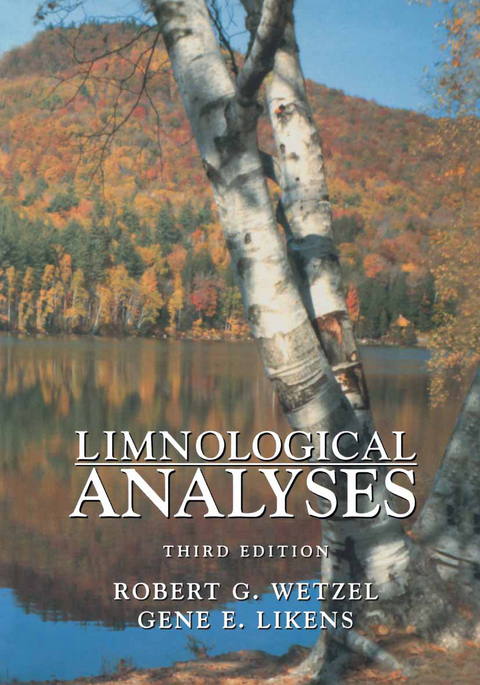
Limnological Analyses
Springer-Verlag New York Inc.
978-0-387-98928-0 (ISBN)
Exercise 1 Lake Basin Characteristics and Morphometry.- Exercise 2 Light and Temperature.- Exercise 3 Physical Characteristics: Lake Models.- Exercise 4 The Heat Budget of Lakes.- Exercise 5 Morphology and Flow in Streams.- Exercise 6 Dissolved Oxygen.- Exercise 7 Inorganic Nutrients: Nitrogen, Phosphorus, and Other Nutrients.- Exercise 8 The Inorganic Carbon Complex: Alkalinity, Acidity, CO2, pH, Total Inorganic Carbon, Hardness, Aluminum.- Exercise 9 Organic Matter.- Exercise 10 Composition and Biomass of Phytoplankton.- Exercise 11 Collection, Enumeration, and Biomass of Zooplankton.- Exercise 12 Benthic Fauna of Lakes.- Exercise 13 Benthic Fauna of Streams.- Exercise 14 Primary Productivity of Phytoplankton.- Exercise 15 Feeding Rates by Protists and Larger Zooplankton.- Exercise 16 Zooplankton Production.- Exercise 17 Predator-Prey Interactions.- Exercise 18 Enumeration of Fish or Other Aquatic Animals.- Exercise 19 Bacterial Growth and Productivity.- Exercise 20 Decomposition: Relative Bacterial Heterotrophic Activity on Soluble Organic Matter.- Exercise 21 Decomposition: Particulate Organic Matter.- Exercise 22 The Littoral Zone.- Exercise 23 Experimental Manipulation of Model Ecosystems.- Exercise 24 Diurnal Changes in a Stream Ecosystem: An Energy and Nutrient Budget Approach.- Exercise 25 Diurnal Changes in Lake Systems.- Exercise 26 Special Lake Types.- Exercise 27 Historical Records of Changes in the Productivity of Lakes.- Exercise 28 Effect of Sewage Outfall on a Stream Ecosystem.- Exercise 29 Estimates of Whole Lake Metabolism: Hypolimnetic Oxygen Deficits and Carbon Dioxide Accumulation.- Appendix 1 General Chemical Relationships.- Appendix 2 Basic Definitions Used in Community Analyses.- Appendix 3 Useful Relationships Relative to the Use of Colorimeters and Spectrophotometers.- Appendix 4 Characteristics and Taxonomic Sources of Common freshwater Organisms.- Appendix 5 SI Conversion Factors.
| Zusatzinfo | XV, 429 p. |
|---|---|
| Verlagsort | New York, NY |
| Sprache | englisch |
| Maße | 178 x 254 mm |
| Themenwelt | Naturwissenschaften ► Biologie ► Ökologie / Naturschutz |
| Technik ► Umwelttechnik / Biotechnologie | |
| ISBN-10 | 0-387-98928-5 / 0387989285 |
| ISBN-13 | 978-0-387-98928-0 / 9780387989280 |
| Zustand | Neuware |
| Haben Sie eine Frage zum Produkt? |
aus dem Bereich


